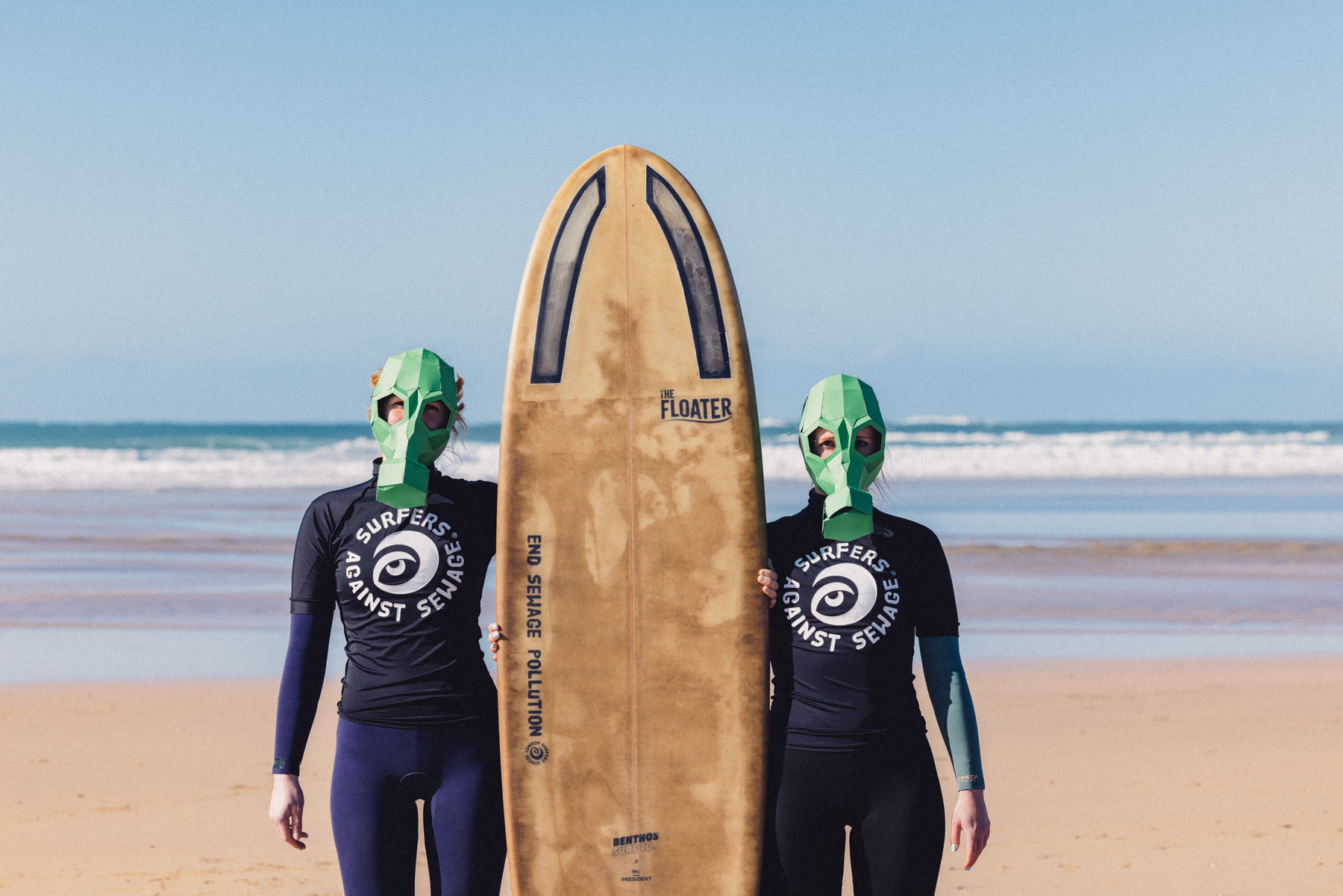Safe to surf? Pollution and politics make waves in Saltburn
Saltburn-by-the-Sea has had something of a renaissance in recent years after decades of decline mirrored at seaside resorts - but it hasn't escaped the national scandal of raw sewage discharges from storm overflows
It’s 8am on a midweek morning in April and the beach at Saltburn-by-the-Sea is already getting busy. It’s a beautiful clear morning, and some were here early enough to catch a perfect East Coast sunrise framed by the chalky cliffs of this North Yorkshire town. But the stormy conditions of the last few days have also created the perfect conditions for an early morning surf.
A handful of local surfers have squeezed themselves into their wetsuits before many others in the town have even brewed their coffee. And there are other visitors too – a small pod of dolphins have popped their noses up above the water left of the town’s distinctive Grade II-listed pier.
It’s magical moments like this that pull surfers like Morgan Rushton out of their comfy beds most mornings.
“There’s nothing quite like it,” the 53 year old tells The Teesside Lead. “Everybody who’s come out this morning is going to be buzzing today and will just feel alive. You can get out there, switch off a bit and just enjoy being at one with nature. The dolphins are about this morning but there are also seals and the odd time you get a huge bloody fish jumping up next to you. It’s just ace.”
It’s why he and his wife, Diane, relocated to Saltburn two years ago.
“We used to live in Knaresborough but we moved for the surf. It was one of those – can we do it? But it was Covid that made us realise we could. Working from home is allowing people to live where they want. A lot of people are moving here because they just love the vibe.”
Since the 1960s locals have known that their waves are as good as any in the world, and now tourists are finally catching on to the quality of the surf in Saltburn-by-the-Sea. But an influx of people brings challenges for Saltburn’s surfers beyond sharing their waves – they fear raw sewage could drive them out of the sea and new regulations could push them out of the town they helped rebuild
A Victorian spa town, Saltburn-by-the-Sea has had something of a renaissance in recent years after decades of decline mirrored at seaside resorts around the UK. Last year the Seaside Heritage Network named the town the number one UK seaside destination. The 138-year-old cliff tramway is a draw, along with the traditional seaside charms of colourful beach huts, ice cream vans and arcades. And then there’s the surf. Arguably the best along the North Sea coast, it’s credited with giving the town its bohemian atmosphere. Today it’s home to a number of quirky and alternative independent shops, bars and restaurants.
“It’s just so different,” says Rushton. “The people, the vibe. It’s quite a creative crowd and it’s really friendly. When the weather’s nice on a summer evening, after people have been in surfing they’ll just sit out chatting on the prom, many of them in camper vans. Then there’s people who live locally who might come out with instruments and play a bit of music – it’s just brilliant. You get that feeling of community spirit. I didn’t have that in Knaresborough.”
This coming May bank holiday locals in Saltburn are expecting it to be busy. Last year Rushton counted 160 surfers out at one time and on a normal good day there might be around 80. Surfing has surged in popularity since lockdown, as more people have realised the physical and mental health benefits of connecting with nature. Increasingly people are seeking to benefit from the natural resources we have on our doorsteps. The sport also made its debut appearance at the Tokyo 2020 Olympics, taking it from counterculture to mainstream sport.
Saltburn has become busier as a result but is still less well known for surfing than other East Coast spots such as Whitby, Robin Hood’s Bay and Scarborough. But surfing here is not a new phenomenon. Saltburn has had a hardcore of dedicated surfers dating back to the 1960s when three young lads read a Sunday Times supplement article about surfing in Hawaii and decided to have a go themselves.
“We knew Saltburn was ideal for it because we were born and bred here. My family had an old Victorian chalet and we’d all been in the sea since we were nippers,” says John Roughton, known locally as one of the “Big Three”. He was 21 in 1965 when he and two friends lit the fuse on the Saltburn surf scene.
“It started with a friend of mine, John Smith, who got the idea and he mentioned it to me when I was home on leave from the Navy,” says Roughton. “So I said, ok, we’ll have a go. We put us money together and he shaped the first board. I think it cost us about £15. He made it because I was away at sea. By the time I got back again it was about ready and he was also starting one of his own, and another friend of ours, Ian Davies, was also starting one.”
Those first boards were 10ft long. They were surprised when they floated and allowed them to paddle out. He doesn’t remember standing up for the first time but he remembers realising he was. He was hooked.
“It was cold because we didn’t have a wetsuit but it was good fun. It didn’t take us long to get the hang of it. I had a full month’s leave so I did nothing else.”
Some of the harshest North Sea temperatures were recorded during the 1960s and the trio soon realised they needed wetsuits. They made their own, sourcing neoprene and sticking the seams with rubber glue. A bottle of talcum powder to help wrangle their bodies into them was an essential piece of kit. A scene began to emerge around them.
“Some of the lads from the local diving club came and joined in so there were soon a few of us doing it, which was surprising because at that point no one went down to the beach. The car park was a wreck and the pier was out of action – it had been badly damaged in a storm so was dangerous. Saltburn was quite dilapidated at that time in the 1960s.
“Within a couple of years we had quite a crowd coming. It was the 1960s so it was all flower power and free love. It was quite good. We’d have beach parties with fires.”
Roughton, the last of the Big Three in Saltburn, is 80 now. Last year he finally hung up his wetsuit – a proper one, not homemade.
“I was doing all right up to 79 and then at 80 it got too cold for me. I was having to expend too much energy to get out, and then the cold gets to you. I am missing it,” he says.
Saltburn is always special for surfing “because it’s my home” but by 1968-69 he and Davies were “trucking all over Europe, looking for surf in our old Volkswagen car with a couple of tents”. He still has a van parked on his drive and has always “trucked” with the family.
“It’s one way to get out of here, isn’t it?”
Escapism is central to surfing and Saltburn is a 12-mile slice of serenity, contrasting with the heavily industrialised towns surrounding it. After Roughton left the Navy, like many locals, he worked in nearby shipyards where he was an engineer.
“When it comes to the North East surfing is a bittersweet story,” says Simon Palmer, a local surfer who documented the town’s surf history in his book Don’t Jump Off The Pier.
“On one hand you’ve got this perception that the North East is cloth caps and whippets, that it’s impoverished, with lots of industry and a bit miserable looking, and yes it is. But then you’ve got the sweet side of it, which is beautiful coastlines, lots of people doing all sorts of interesting things. There’s this surfing scene and this beauty in among the grit.”
Palmer, who was also a Navy man, moved to Saltburn from Plymouth over 30 years ago. He says he has saltwater running through his veins. He’s one of the locals down on the beach this morning.
“When I'm surfing I’m the true me,” he says. “This is where I’m happiest.” But he points out that surfing in the bitterly cold North Sea entails a certain hardship you have to endure. In that way it’s not a million miles from the industrial legacy of Teesside.
The pioneers agree that contrasts with the warm nature of the surf scene here.
“The people are authentic and fun,” says Palmer. “Wherever you surf you can get quite a high degree of localism and territorialism. What you find here is people are very passionate and proud of their local spot – but they are very giving.”
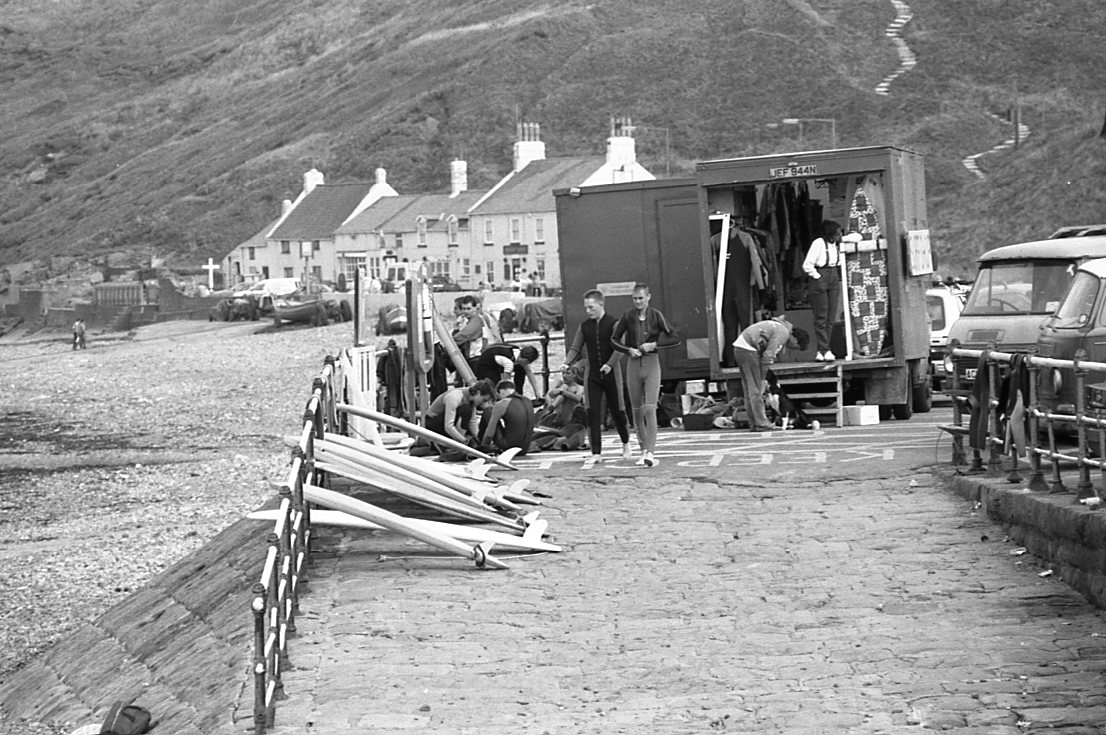
Gary and Nick's mobile surf shop
They are reluctant competitors even when competition gets formal. Evan Rogers was up early this morning to catch the surf in Saltburn, and had already packed up his gear by the time the dolphins made an appearance. It’ll be his last paddle out here for a couple of weeks. He’s driving to Wales to collect teammate Tom Fisher and tomorrow the pair are flying to El Salvador for the 2024 ISA World Longboard Championships.
“The longboard comps were much more friendly than the shortboard comps. I had more fun at them and I did better in them,” says Rogers. The bigger board, he explains, is more stable when cutting through water. They’re better for beginners, and offer a smoother ride.
“I still do shortboarding when the waves are really good, but shortboarding is very competitive so there’s a bit of a nastiness to it. I’m not super competitive so I didn’t really like that. With longboarding we all just have a good time and just try and surf our best.”
Growing up here was great, says Rogers. “The whole community knew everyone and I’d always meet up with mates and go surfing. People don’t realise how good the North East waves are. Saltburn is definitely my favourite spot – not necessarily Saltburn beach, but nearby. I can’t give away my secret spots but they’re close and they’re as good as anywhere in the world.”
Now 33, Rogers has been stand-up surfing since he was seven. Before that he was boogie boarding, having learnt to swim in the sea aged three. That begins to make sense on meeting the man he credits as his main influence – his dad, Gary.
“Evan’s made me proud since he was a kid,” he says from Saltburn Surf Shop, just beyond the pier on the Lower Promenade. Gary’s been in the shop he set up alongside Nick Nobel since the 1990s. Before that, in the 1980s, the pair ran a mobile surf hire shop and became the second wave of pioneers on the Saltburn surf scene – creating the infrastructure the community needed to thrive.
“I’m from South Wales originally and I came up here about 1978 for a locally-run surf contest,” says the 66 year old. “There were probably about 20 surfers living at Saltburn about that time and back in those days you knew everybody who surfed. It was a dead friendly place and everybody would buy their wax off you, whereas they don’t now – they get it online. Then you’d get travelling surfers like Californians and Australians and they’d always say what a friendly place this was. And it was because we knew virtually everyone.”
That changed about seven years ago, Gary says, and now new faces turn up each weekend.
“It’s still a friendly place compared to many places you surf around the world,” he says.
“There are certain etiquettes in surfing, like you don’t spoil other people’s waves. If you start doing that when you’re abroad the locals dislike it so you have to ease yourself in. Get friendly and the locals will take you in – and they always do in Saltburn.”
Nobel, who now runs Saltburn Surf School alongside Zoee Jones, a stone’s throw from the surf shop, echoes his old colleague’s feelings.
“It’s very different to the scene I knew when I started surfing in the 1970s. But Saltburn still has what it originally had to offer – it’s a great place to learn to surf with its gently shelving, largely north-facing beach. We get a lot of good waves that are fairly accessible to beginners or improvers particularly. Those qualities are timeless.”
Like the Big Three before him, Noble built his first board himself, when home from Sheffield University one weekend with a friend.
“I remember using this surfboard we’d made, my very first attempt at catching a wave, and it changed my life. It was such a thrill and I knew it was something I wanted to do.
“There was a smaller surf fraternity back then. People knew each other and we’d all hang out together. We used to have social dos and we had a lot of friends. We were young, it was all new and it was fantastic. Nowadays I’m out in the sea surfing and there are more I don’t know than I do”.
A national scandal overflows in Saltburn
The growth of Saltburn brings challenges beyond sharing the surf, however. Growth in population, and the infrastructure that goes with it, means more sewage. Saltburn hasn’t escaped the national scandal of raw sewage discharges from storm overflows. In August, water was seen gushing from manhole covers on the promenade while lifeguards ushered surfers and others away following a major discharge by Northumbria Water on to Saltburn Beach. The company blamed “intense and prolonged” rainfall but it was far from a one-off occurrence – Northumbria Water was responsible for 46,492 discharges of raw sewage into waterways in 2023. The deep irony for surfers is that the adverse weather conditions that create the perfect conditions for good waves put pressure on ageing sewage systems.
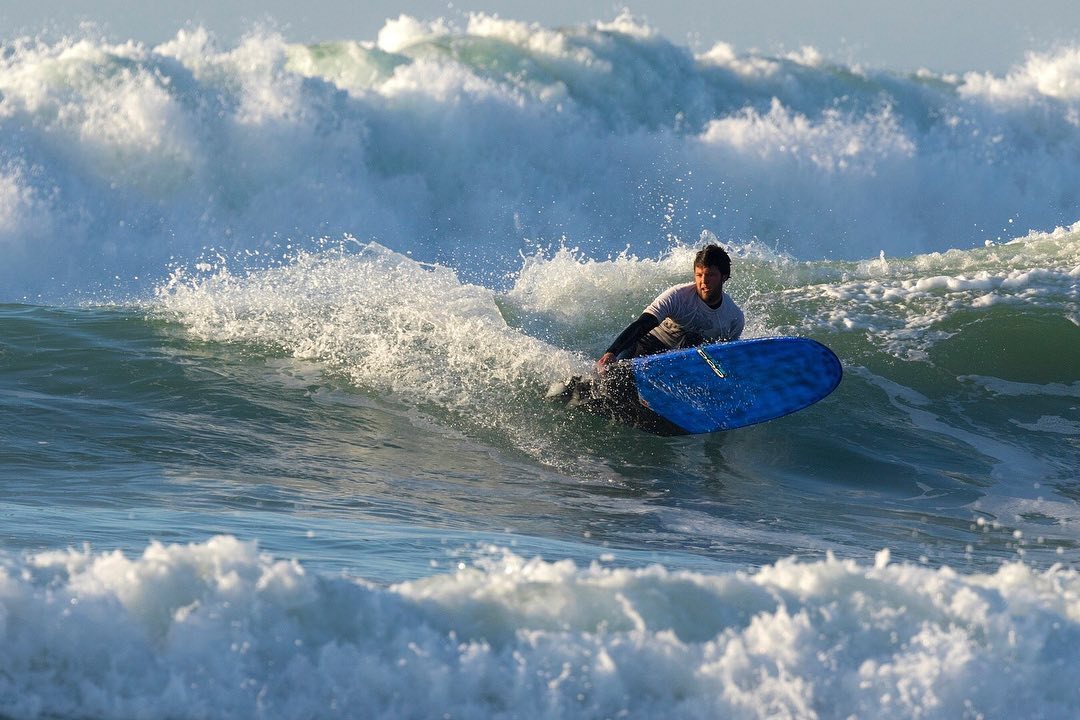
Evan Rogers in surfing action
Steve Thomas, who’s lived in Saltburn all his life, was among a number of people who fell ill after surfing in Saltburn over Easter weekend. He believes a sewage discharge was responsible.
“There were a few of us who were ropey for a few days,” he says. “I’d been out on the Friday and Saturday and had a really bad stomach. I should have known better.”
Northumbria Water did not provide comment to The Teesside Lead when asked whether surfers should be avoiding the water following heavy rainfall. Nor did it comment on whether it felt it is acceptable that people should have to avoid surfing or swimming for fear of falling ill.
The Rivers Trust has recorded verified sewage discharges after the event, while grassroots environmental charity Surfers Against Sewage (SAS) runs the Safer Seas and Rivers Service – an app informing users of real-time alerts about overflows. Users can also record their own evidence and experiences. In Saltburn 30 users have reported sickness after swimming since 2020.
John Reeve, Saltburn rep for SAS – which hosts its annual Paddle Out protest on 18 May – describes the gamble surfers take.
“When conditions are ideal for surfing, experienced people will still tend to go,” he says.
Not because they have any skill in avoiding pollution, he explains, but because the lure of the waves is too strong.
“If it was a big heavy swell with four-foot waves dumping through, one or two days after heavy rainfall, I personally wouldn’t want to go out. If it was a nice little mellow wave and I’m thinking, I’m not going to get dumped in this and I’m not going to swallow much water, I’d still go.”
The app also records upstream concerns.
"We need to be aware that what’s going on is Guisborough, what’s going on in Brotton, and what’s going on in Lingdale has exactly the same effect as what’s going on in Saltburn.”
Last year the government issued an updated Storm Overflows Discharge Reduction Plan and Northumbria Water has followed its directives to improve them. But Reeve takes issue with the timescale.
“High-priority storm overflows, of which we in our area have five, and bathing water storm overflows, of which we have three, need to be sorted by 2035. The low-priority storm overflows – we have a further five – have until 2050. My son will be 50. So in this politically-driven year that’s what we have to say – it’s not enough, not soon enough.”
Northumbria Water did not respond to The Teesside Lead’s question of whether it planned to expedite any of its improvement works. In 2023 the company recorded profits of £211.6m and shareholders – the majority owner being Hong Kong-based CK Hutchison Holdings – were paid dividends of £105m. By the company’s own calculations, Saltburn and the neighbouring areas of Skelton and Brotton require £43.33m investment to improve storm overflows.
The company did not address The Teesside Lead’s question on whether it should invest some of its profits in improvements instead of returning them to shareholders. Nor did it answer how it can justify a £215,000 bonus to chief executive Heidi Mottram in 2023 when improvement works are needed.
A spokesperson for Northumbrian Water said: “We share our customers’ passion for having a healthy, thriving water environment and as part of our business plan for 2025-2030 a proposed a £947m investment has been earmarked to reduce the impact of storm overflows, which play a crucial role in protecting the local area.
“Alongside our partners and others, whose activities have an impact on bathing water quality, we are committed to playing our part in ensuring high standards are achieved and maintained.”
Sewage isn’t the only problem for Saltburn’s surfers. Parking is another. On 4 March Redcar and Cleveland Borough Council issued a Traffic Regulation Order prohibiting the parking of camper vans on Marine Parade and Glenside in Saltburn between 8pm and 8am. Rushton says the community spirit brought about by surfers and campers who enjoy the beach at sunrise or sunset is now under threat.
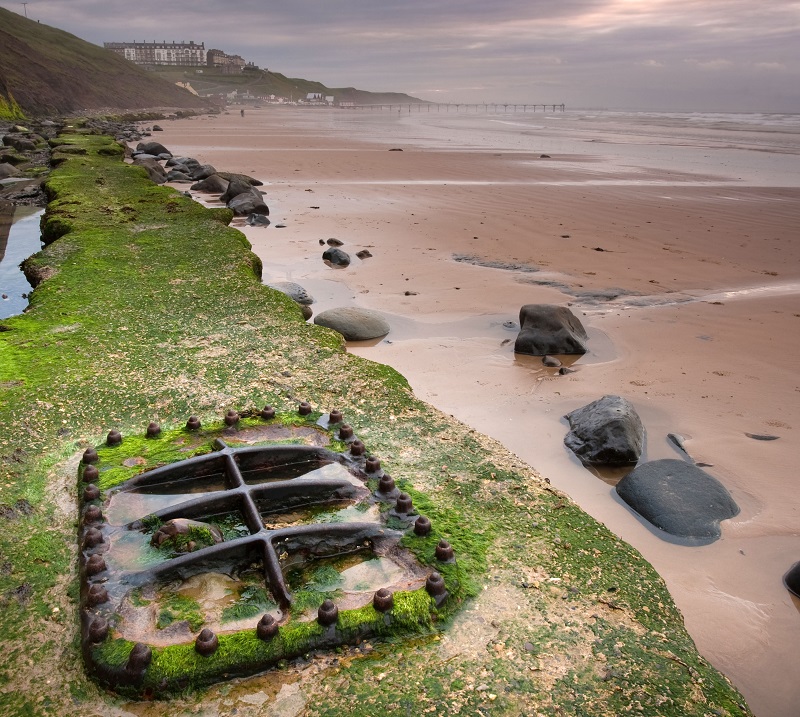
A sewage inspection hatch at Saltburn-by-the-Sea
“The camper vans are what give the place its feel and its vibe, and they bring money to the economy. Where are they going to go? On to the nearest street where they’ll just cause chaos for all the residents. If that culture goes they’ll just turn the town into Eastbourne or somewhere like that where people go off to die.”
Diane Ruston has launched a change.org petition aimed at the council which has since requested a meeting to discuss the issue. The council told The Teesside Lead that members of the public were given the opportunity to take part in a consultation as part of the Traffic Order Regulation process. It said: “Now the consultation has closed the feedback is being considered before a decision is made”.
Thomas, 59, was introduced to surfing aged 12 while working for his granddad in his ice cream van on Saltburn seafront. He believes there’s a “political agenda” behind the parking ban.
“Twenty years ago, when Saltburn was a ghost town, it was the fishermen, the dog walkers and the surfers who kept the businesses afloat. Now it’s got this high-end tourist attraction umbrella, the council seems to have an agenda to go further with it.”
His assessment echoes Roughton’s who, remembering the shut-down beach of the 1960s, says: “Surfing was the start of the regeneration of Saltburn”.
“Now the council wants the surfers out of town – there’s no doubt about that,” says Thomas. “Not all campers are friendly, happy people – there are townies who have just bought a van after Covid and leave a mess. But there are more who have a natural interest in the environment and have a very earthy way of life and are extremely beneficial for the area.
“They bring money into the economy and quite often a lot of them clean up and take away more rubbish than they bring. Yet they’re the ones getting picked on.”
Jessie Joe Jacobs, who has surfed in Saltburn for 19 years, is the director of the campaigning group Democracy Network. In 2021 she ran against Ben Houchen as the Labour candidate for Tees Valley Mayor. She disagrees with Thomas that the council wants to push surfers out but believes their voices should be heard.
“Councils need to make decisions collaboratively with communities,” she says. “It’s when communities feel they haven't been listened to that they begin to feel pushed out.”
Surfing is intrinsically linked to Jacobs’ politics.
“I surfed before I was political and what being in nature and passionate about it gave me was a perspective on the fragility of our oceans and knowing that a lot of that can be connected to political decisions that are made,” she says. “You feel like the ocean’s giving you something so you want to give something back. So for me, being in positions where I may have had power, it was automatic for me to use that to try and bring about change and protection for our seas.”
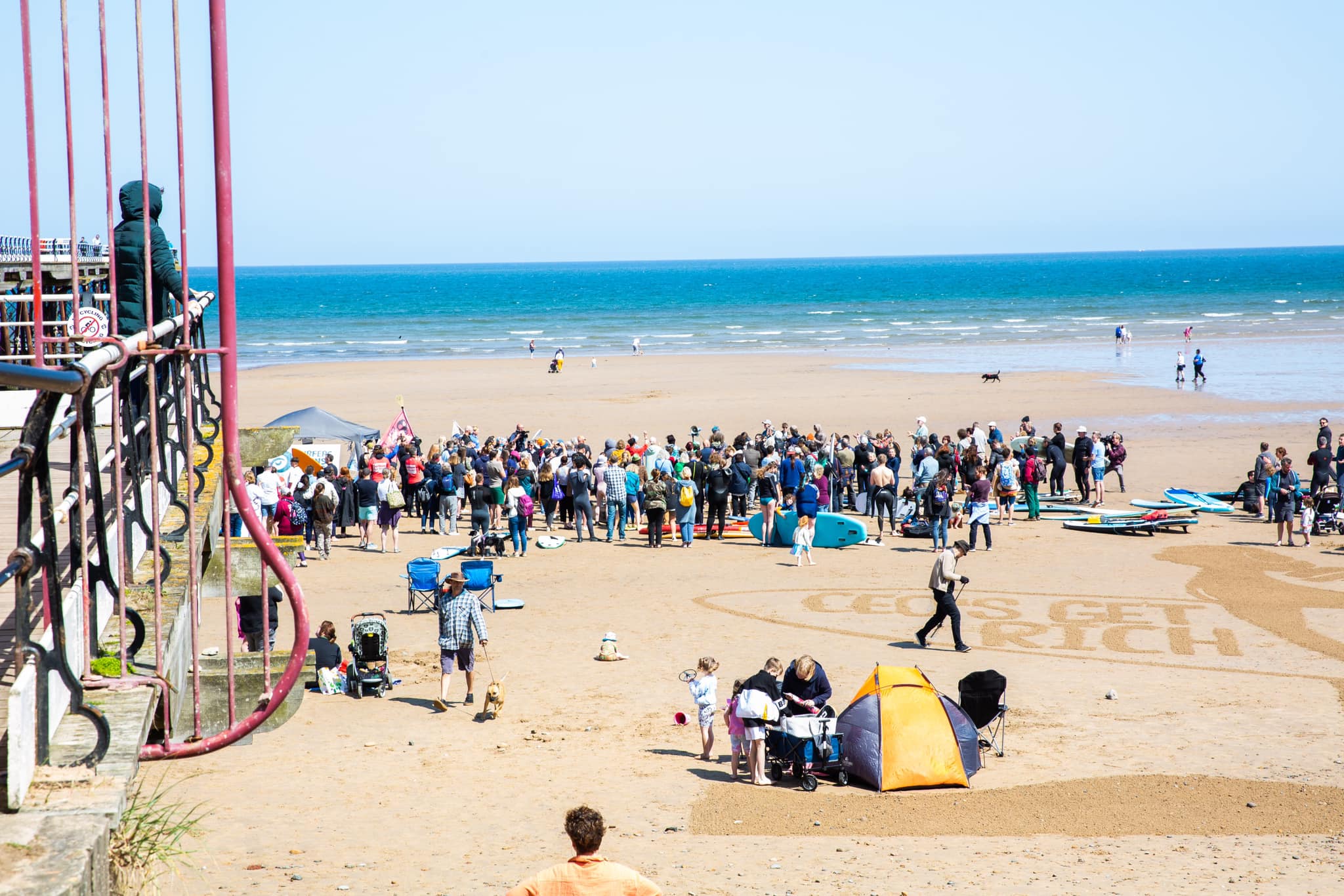
Surfers Against Sewage at Saltburn-by-the-Sea
Currently based in Cornwall, Jacobs is working with Newquay Women’s Surf Club, which aims to promote women who want to get in the sea. It’s a model she thinks would benefit Saltburn as well. Alongside women like Emma Tweddle, who advocates for the mental health benefits of surfing, and Zoee Jones, who runs Saltburn Surf School with Nobel, Jacobs is part of yet another generation who have made waves on the Saltburn surf scene. But she says women “sometimes need that extra bit of encouragement to get out there”.
“It’s growing and there are a lot more women now. When I started there was probably a handful of us. And the bigger the waves and more challenging the conditions, the less females you’d see on the line-up.
“Surfing is also a mental game and, if there’s not many women showing what’s possible in the sport, it’s harder to get in the mindset that you can be out there and you can surf those big waves,” she says, name-checking Bamburgh’s Emily Grimes as one local woman pushing those boundaries.
Jacobs echoes others in saying Saltburn’s close-knit and friendly surf community is unique. And, like others across the generations in this unassuming hub of surf culture, she stresses its addictive nature.
“You can get into a meditative state because it requires you to switch off from the world and focus on it. There’s nothing more beautiful than a sunrise or sunset when the sea turns pink and you’re just sat there on your board, immersed in the nature around you. There’s the camaraderie and then there’s the feeling of catching an amazing wave.
“I’ve been doing it 19 years but I can still get the same joy I did when I first got on my feet for the first time. It’s a special sport.
“All I’d say is get out there and try it. The smile on someone’s face when you see them catch a wave for the first time – it just brings a thrill and adrenaline that not much else in life can give you.”
Subscribe to The Teesside Lead for our news, recommendations and investigations here.
You can also read the previous edition of The Teesside Lead here
The Teesside Lead is now on Substack.
Become a Member, and get our most groundbreaking content first. Become a Founder, and join the newsroom’s internal conversation - meet the writers, the editors and more.


